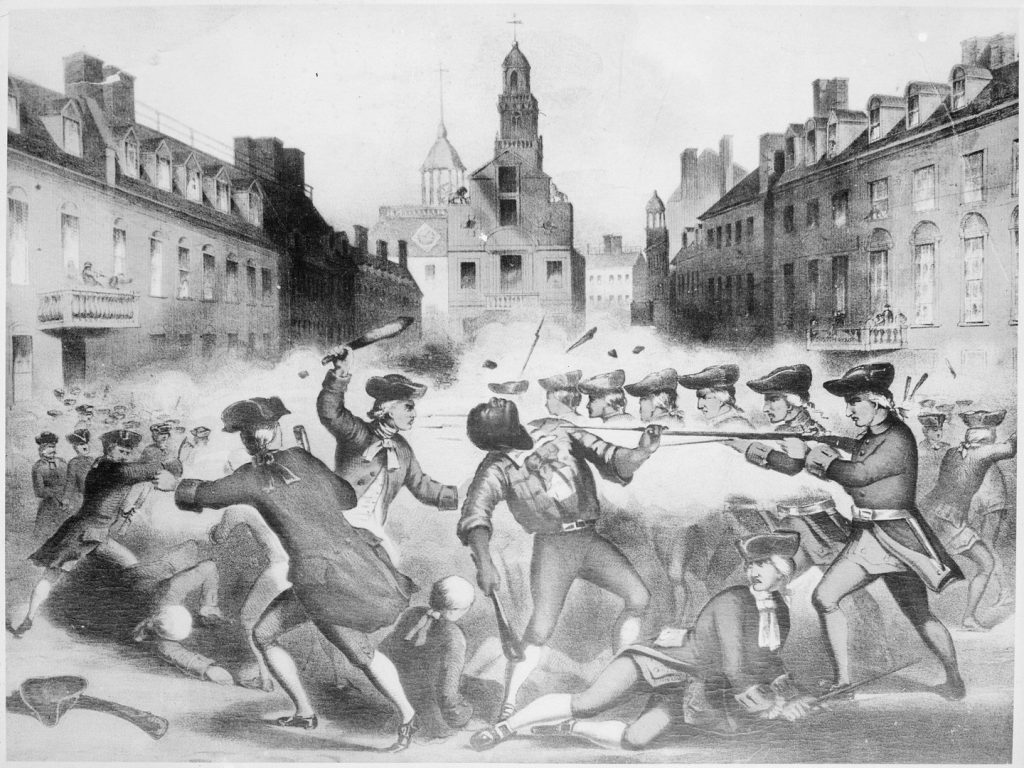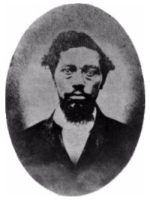“The First Blood Spilt to Freedom”: Dangerfield Newby, the Boston Massacre, and Crispus Attucks 250 Years Later
Every quest for liberty has its first martyr. Two-hundred and fifty years ago this evening, the cause of American liberty gained its first five when British soldiers fired on a crowd of Bostonians in an event immortalized as the Boston Massacre.
The first to fall at the end of the British muskets was Crispus Attucks, a mariner of mixed African and Native American heritage. Bostonians paraded Attucks’ remains alongside the four other victims to a common grave but Attucks’ popularity did not grow until the next century when abolitionists used him as a symbol of patriotism. Abolitionists emphasized and stretched Attucks’ role. To supporters of abolition, Attucks was a household name.

Eighty-nine years later, a force of twenty-two men, both white and black, raided the Federal gun factories at Harpers Ferry to strike slavery down. Led by John Brown, this plan ultimately failed, at least in the short term. Many of Brown’s followers died for the liberty of millions of slaves.
Days away from the “dark and gloomy gallows, with all its terrors,” freed African American and follower of Brown’s John Copeland had a chance to reflect on his past deeds and those who joined him at Harpers Ferry. The doomed man, who was captured by armed citizens, determined, “I am dying for freedom. I could not die for a better cause. I had rather die than be a slave.” While the shadow of the gallows hung over Copeland, he still took hope from a history lesson: the Boston Massacre.

Dear friend it is true that the [outbreak] at Harper’s Ferry did not give immediate freedom to the slaves of this cuntry but it is the prelude to that great event. For remember at the first commencement of the strugle for Indipence of this cuntry, that the Harper’s Ferry outbreak is in every point of view the same. For at the commencement of that strugle the first blood spilt to freedom the American people was that of a negro, poor Cyrus Attuc, and in this the commencement of the struggle for the freedom of the negro slave the first blood spilt was that of a Negro (one who had come to try to free his wife from the cruel hands of her master), Dangerfield Newby.
Neither Attucks when he arrived in front of the Old State House in Boston nor Dangerfield Newby when he took up arms and marched to Harpers Ferry expected or desired to become martyrs for causes greater than themselves. But their deaths made them martyrs that still hold meaning centuries after their deaths.
Tonight at 9pm in front of the Old Courthouse, the Virginia Society Sons of the American Revolution will be in Old Town Winchester, VA and the tower bell and several tower bells in town will be rung at the exact time of the Boston Massacre to commemorate the 250th Anniversary. Revolutionary costumed participants will be on the mall with lanterns portraying the era!
Wow, thanks for this Kevin. I’m sorry to say that I’ve never heard of Mr. Attucks, but will remember and honor him from now on. I’m surprised though that you talk of him and then John Brown’s Raid without mentioning Heyward Shepherd, a black man shot and killed by Brown’s raiders. Now how ironic is that? Heyward’s story is very controversial today for obvious reasons, but facts are facts. A great reminder that history is not always the cut and dry subject it is often made out to be.
Matthew, thanks for reading and your comment. I didn’t mention Shepherd even though he was the first casualty of Brown’s Raid because he was not a part of Brown’s force but instead a citizen of Harpers Ferry. Now there’s some irony! However, Dangerfield Newby was the first casualty among Brown’s party, hence his association with Attucks by Copeland.
Ha ha, man you’re a fast responder on here. I just wanted to say I’m not criticizing at all, I just saw an opportunity to mention Heyward and ran with it. I actually just learned about him myself a few years ago and was blown away by the irony of his story. I’m very intrigued by stuff like that. I feel that too often, in regards to history and politics, our society wants a simple, you vs me, or the good guy vs bad guy scenario. In truth and reality though, history and politics are much more complicated and muddied than that, less black and white, more gray, if you catch my drift. I think a lot of us Civil War nerds get that, but the majority of folks sadly do not.
Matthew, don’t worry, no offense taken at all. I always appreciate you reading posts and commenting. I agree with you, the answer is never quite as simple as it often seems!
Boston: Antifa vs. Redcoats.
Definitely more of a mob or rabble than Antifa. Antifa might would like to think they’re similar to the Sons of Liberty, but they’re something less.